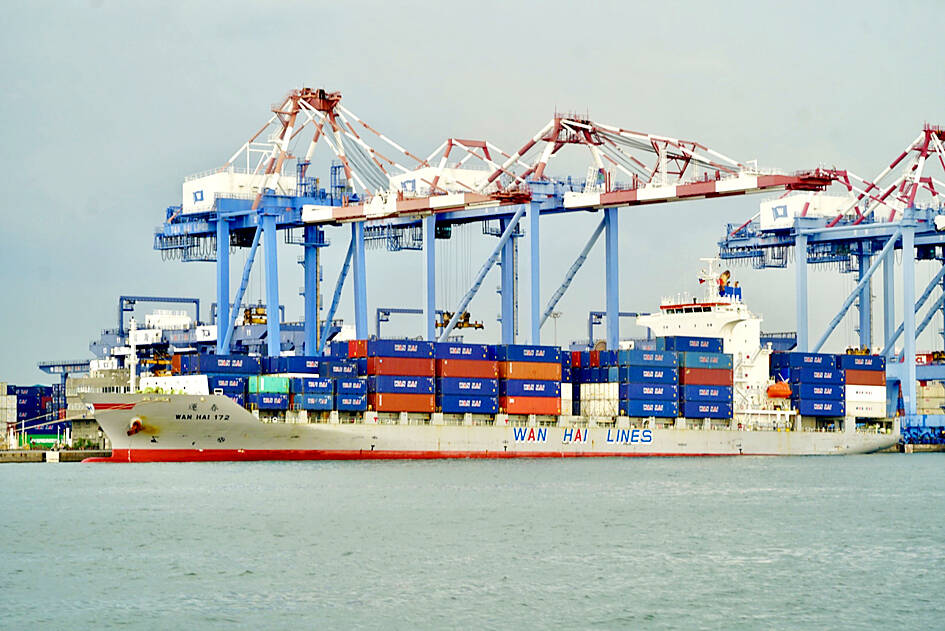Wan Hai Lines Ltd (萬海航運) plans to expand its capital expenditure for next year to NT$1.53 billion (US$49.2 million) from NT$1.3 billion this year, as it receives new vessels to boost its fleet, the shipping company told an online investors’ conference yesterday.
The spending for next year would surpass last year’s record NT$1.5 billion.
The shipping company plans to take delivery of 12 ships with a combined capacity of 52,430 twenty-foot equivalent units (TEUs) this year, 24 vessels with a combined capacity of 173,558 TEUs next year and 14 ships with a combined capacity of 103,040 TEUs in 2024, it said.

Photo: CNA
Overall, Wan Hai would receive 50 new vessels from this year to 2024, including 18 ships whose capacity exceeds 13,000 TEUs, which would be put on Asia-North America or Asia-South America routes, spokeswoman Laura Su (蘇麗梅) said.
Wan Hai’s business in the first half of the year was mainly focused on the intra-Asia market, which accounted for 59 percent of its freight volume, Su said, adding that the Americas accounted for 25 percent, up from 17 percent a year earlier.
Wan Hai’s revenue from North and South American operations made up 59 percent of its total revenue in the first half of the year, compared with 40 percent a year earlier, thanks to rising shipping rates for the American markets.
Shipping rates for the intra-Asia region dropped sequentially last quarter, which drove revenue contribution from this route down to 26 percent from 40 percent a year earlier.
Wan Hai president Tommy Hsieh (謝福隆) said he expects rates to recover next quarter,
“Since the third quarter is a slow season, a correction in shipping rates is normal, but next quarter would be a peak season,” he said.
Like Yang Ming Marine Transport Corp (陽明海運), Wan Hai’s clients have also asked to renegotiate freight rates and the company, in principle, would offer short-term discounts to address such requests to build up long-term partners, Hsieh said.

BIG BUCKS: Chairman Wei is expected to receive NT$34.12 million on a proposed NT$5 cash dividend plan, while the National Development Fund would get NT$8.27 billion Taiwan Semiconductor Manufacturing Co (TSMC, 台積電), the world’s largest contract chipmaker, yesterday announced that its board of directors approved US$15.25 billion in capital appropriations for long-term expansion to meet growing demand. The funds are to be used for installing advanced technology and packaging capacity, expanding mature and specialty technology, and constructing fabs with facility systems, TSMC said in a statement. The board also approved a proposal to distribute a NT$5 cash dividend per share, based on first-quarter earnings per share of NT$13.94, it said. That surpasses the NT$4.50 dividend for the fourth quarter of last year. TSMC has said that while it is eager

‘IMMENSE SWAY’: The top 50 companies, based on market cap, shape everything from technology to consumer trends, advisory firm Visual Capitalist said Taiwan Semiconductor Manufacturing Co (TSMC, 台積電) was ranked the 10th-most valuable company globally this year, market information advisory firm Visual Capitalist said. TSMC sat on a market cap of about US$915 billion as of Monday last week, making it the 10th-most valuable company in the world and No. 1 in Asia, the publisher said in its “50 Most Valuable Companies in the World” list. Visual Capitalist described TSMC as the world’s largest dedicated semiconductor foundry operator that rolls out chips for major tech names such as US consumer electronics brand Apple Inc, and artificial intelligence (AI) chip designers Nvidia Corp and Advanced

Saudi Arabian Oil Co (Aramco), the Saudi state-owned oil giant, yesterday posted first-quarter profits of US$26 billion, down 4.6 percent from the prior year as falling global oil prices undermine the kingdom’s multitrillion-dollar development plans. Aramco had revenues of US$108.1 billion over the quarter, the company reported in a filing on Riyadh’s Tadawul stock exchange. The company saw US$107.2 billion in revenues and profits of US$27.2 billion for the same period last year. Saudi Arabia has promised to invest US$600 billion in the US over the course of US President Donald Trump’s second term. Trump, who is set to touch

SKEPTICAL: An economist said it is possible US and Chinese officials would walk away from the meeting saying talks were productive, without reducing tariffs at all US President Donald Trump hailed a “total reset” in US-China trade relations, ahead of a second day of talks yesterday between top officials from Washington and Beijing aimed at de-escalating trade tensions sparked by his aggressive tariff rollout. In a Truth Social post early yesterday, Trump praised the “very good” discussions and deemed them “a total reset negotiated in a friendly, but constructive, manner.” The second day of closed-door meetings between US Secretary of the Treasury Scott Bessent, US Trade Representative Jamieson Greer and Chinese Vice Premier He Lifeng (何立峰) were due to restart yesterday morning, said a person familiar